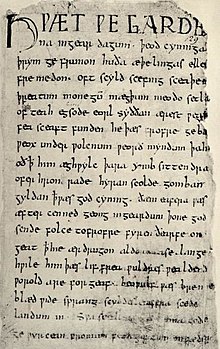Old English – from the mid-5th century to the mid-11th century
After the Anglo-Saxon invasion, the Germanic language possibly displaced the indigenousBrythonic languages and Latin in most of the areas of Great Britain that later becameEngland. The original Celtic languages remained in parts of Scotland, Wales and Cornwall(where Cornish was spoken into the 19th century), although large numbers of compound Celtic-Germanic placenames survive, hinting at early language mixing.[3] Latin also remained in these areas as the language of the Celtic Church and of higher education for the nobility.Latin was later to be reintroduced to England by missionaries from both the Celtic and Roman churches, and it would, in time, have a major impact on English. What is now calledOld English emerged over time out of the many dialects and languages of the colonising tribes.[4] Even then, Old English continued to exhibit local variation, the remnants of which continue to be found in dialects of Modern English.[4] The most famous surviving work from the Old English period is the epic poem Beowulf composed by an unknown poet.
Old English varied widely from modern Standard English. Native English speakers today would find Old English unintelligible without studying it as a separate language. Nevertheless, English remains a Germanic language, and approximately half of the most commonly used words in Modern English have Old English roots. The words be, strong andwater, for example, derive from Old English. Many non-standard dialects such as Scots andNorthumbrian English have retained features of Old English in vocabulary and pronunciation.[5] Old English was spoken until some time in the 12th or 13th century.[6][7]
In the 10th and 11th centuries, Old English was strongly influenced by the North Germanic language Old Norse, spoken by the Norsemen who invaded and settled mainly in the North East of England (see Jórvík and Danelaw). The Anglo-Saxons and the Scandinavians spoke related languages from different branches of the Germanic family; many of their lexical roots were the same or similar, although their grammars were more divergent.
The Germanic language of the Old English-speaking inhabitants was influenced by extensive contact with Norse colonizers, resulting perhaps in cases of morphological simplification of Old English, including the loss of grammatical gender and explicitly marked case(with the notable exception of the pronouns). English borrowed approximately two thousand lexical items from Old Norse, including anger, bag, both, hit, law, leg, same, skill, sky, take, and many others, possibly even including the pronoun they.[8]
The introduction of Christianity late in the 6th century encouraged the addition of over 400 Latin loan words, such as priest, paper, and school, and fewer Greek loan words.[9] The Old English period formally ended some time after the Norman conquest (starting in 1066 AD), when the language was influenced to an even greater extent by the Normans, who spoke a French dialect called Old Norman. The use of Anglo-Saxon to describe a merging of Anglian and Saxon languages and cultures is a relatively modern development.

No comments:
Post a Comment